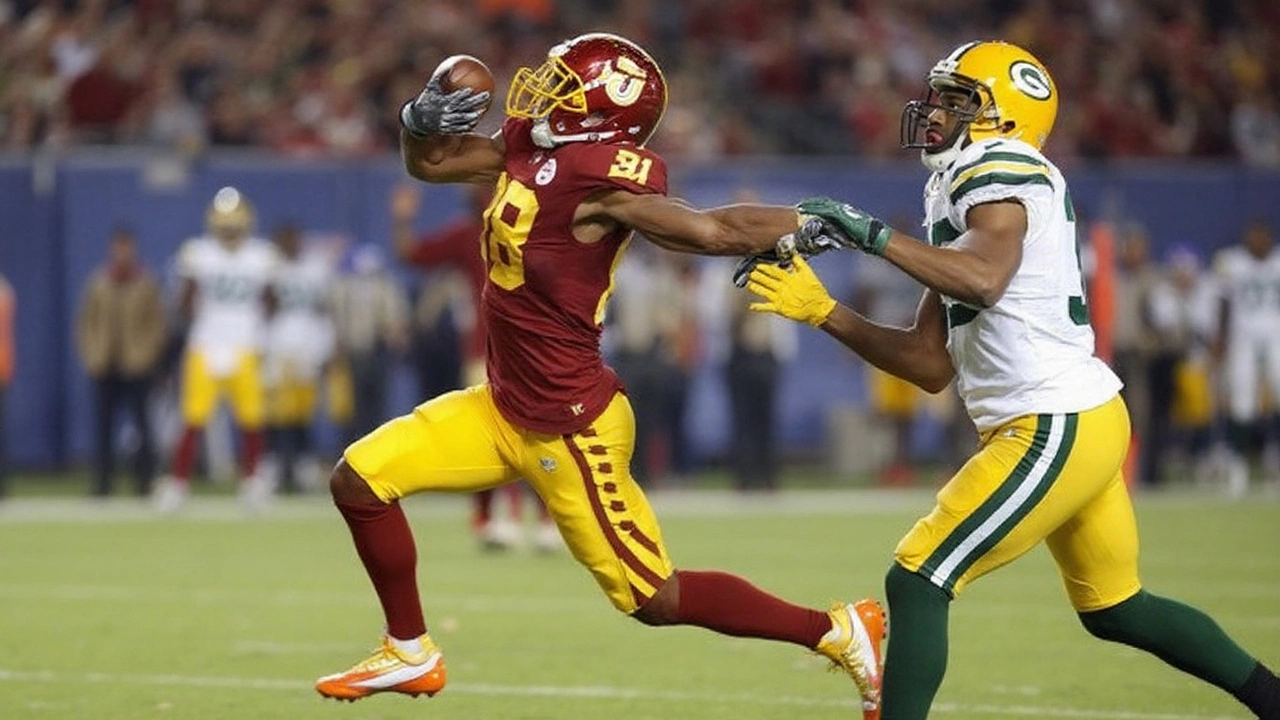Packers flex on a short week, move to 2-0 with a prime-time win
On a chilly Thursday night in Green Bay, the Green Bay Packers handled their business with a 27-18 win over the Washington Commanders, pushing their record to 2-0 and sending a message about how they plan to win this season: play clean, hit hard, and make the most of matchups. The Week 2 game at Lambeau Field never got out of hand, but it also never felt like the Packers lost control.
Jordan Love looked calm and steady from the opening series, throwing for 292 yards and guiding a balanced attack that racked up 404 total yards. He didn’t force throws into tight windows, leaned on his tight ends, and picked his shots off play action. It was the kind of efficient, low-drama quarterbacking that keeps drives moving and defenses on their heels.
The headline performance belonged to tight end Tucker Kraft, who turned six catches into 124 yards and a touchdown. He did his damage up the seam, on crossers, and after the catch, breaking tackles and turning short throws into chunk gains. It was the first 100-yard game of his career and the clearest sign yet that he’s becoming a true centerpiece in Matt LaFleur’s plan.
Green Bay’s ground game did its part. Josh Jacobs wasn’t chasing splash runs as much as leaning into a bruising style that set up manageable downs and kept Washington guessing. His patient cuts, plus consistent yards after contact, helped shape the flow of the night. When the defense had to respect the run, Love found spaces behind linebackers and attacked them.
Romeo Dobbs added a touchdown on a route that Washington couldn’t smother, a clean design that created just enough separation in single coverage. It wasn’t a volume night for the Packers’ receivers, but it didn’t need to be. This was a game about rhythm and answers—every time Washington hinted at momentum, Green Bay answered with a drive that flipped the field or points that quieted the push.
Defensively, the Packers looked fast and mean. The plan was to muddy the picture for a rookie quarterback and then win on downs with disciplined rush lanes and sure tackling. That worked. Washington’s first seven possessions produced just three points, a stretch that framed the entire night. The addition of Micah Parsons mattered even on a pitch count; his presence alone changed protection calls and squeezed edges, and the front took advantage with steady pressure rather than all-out blitzing.
The secondary played in phase, challenged throws outside the numbers, and squeezed windows in the middle. Green Bay didn’t need turnovers to tilt the field—their early three-and-outs and short fields for the offense did enough damage. You could see the defense settling into a clear identity: close air space, rally to the ball, and let the pass rush win late in the down.
Special teams weren’t flashy but did the small things—smart fair catches, clean holds, and coverage lanes that didn’t gift Washington any free yards. On a short week, eliminating mistakes is almost as valuable as making big plays, and Green Bay avoided the kind of errors that swing prime-time games.

Washington’s rookie fights back, but Green Bay sets the terms
Jayden Daniels didn’t flinch. The rookie quarterback had to live through a first half where his offense was stuck in the mud, but he kept Washington within reach and dragged the game into a one-possession window in the fourth quarter. He extended plays with his legs, found Curtis Samuel in stride on key downs, and showed poise under a steady rush. That late surge is the kind of tape a young quarterback can build on.
The problem for Washington was the climb. Early possessions stalled thanks to negative plays and long third downs, and field position tilted against them. The Commanders needed a spark—an explosive play, a sudden change series, something to tilt Green Bay out of its groove. It didn’t come often enough. Green Bay’s defense kept everything in front, then swarmed.
Still, there were bright spots. Washington strung together a few answer drives in the second half, leaning on quick game concepts and designed movement to get Daniels on the edge. The timing with Samuel looked sharp, and the screen game found a little daylight. Defensively, the Commanders forced field goals in spots that could have blown the game open. They didn’t get overrun; they just couldn’t flip momentum for long.
Both teams entered Thursday at 1-0 after convincing openers—Washington beat the Giants, and the Packers handled the Lions—and this felt like an early NFC measuring stick. The difference was Green Bay’s execution on the basics. The Packers consistently won first down, kept penalties in check, and played the field-position game. Washington had to chase, and chasing on the road in Green Bay on a short week is a tough ask for any roster, let alone one breaking in a rookie quarterback.
What stood out tactically? Green Bay leaned hard into motion and condensed formations to force Washington’s defense to declare, then attacked leverage with tight ends and option routes. Love’s best throws came off actions that moved the pocket or froze linebackers just long enough for Kraft to slip behind them. On the other side, Washington tried to stress Green Bay with tempo in spurts and spacing concepts that gave Daniels quick, clean reads. It helped in the second half, but the early hole loomed too large.
There was also a tone to the game—physical without being sloppy. Jacobs and the offensive line set it when drives needed a nudge, and the Packers’ defense finished tackles. Washington matched that intensity in the fourth quarter and made Green Bay earn every late yard. But by then, the Packers had banked enough plays to manage the clock and control the endgame.
For Green Bay, this is how you build a season. Stack wins, keep your quarterback upright, and let new pieces on defense settle in without overextending them. Parsons isn’t at full workload yet, but his presence shifts matchups across the line. As he ramps up, the ripple effect could turn a good defense into a problem for everyone on the schedule.
For Washington, there’s no shame in this kind of loss. Daniels didn’t blink under the lights and found answers late. The timing with Samuel is real, and the staff has a clear path to speed up his process with quick-game packages and designed movement. Cleaning up early-down execution and staying out of third-and-long will be the difference between competitive and contending.
Both teams now get a mini-bye, with 10 days to reset before Week 3. The Packers sit at 2-0 and look like an NFC team with staying power—built on balance, tight execution, and a defense that’s already playing like one of the league’s stingiest. Washington drops to 1-1, but with clear progress at the most important position and a defense that battled even as the field shortened.
Key numbers and moments to remember:
- Jordan Love: 292 passing yards, steady and efficient in high-leverage spots.
- Tucker Kraft: 6 receptions, 124 yards, 1 touchdown—the first 100-yard game of his career.
- Romeo Dobbs: touchdown reception on a well-timed single-coverage beater.
- Josh Jacobs: power runs that kept the offense on schedule and the clock moving.
- Defense: held Washington to three points across its first seven possessions, setting the tone.
The fireworks after the final whistle fit the night at Lambeau. Not a blowout, not a thriller—just a convincing, grown-up win over a fellow NFC hopeful. That’s how you build credibility in September.


